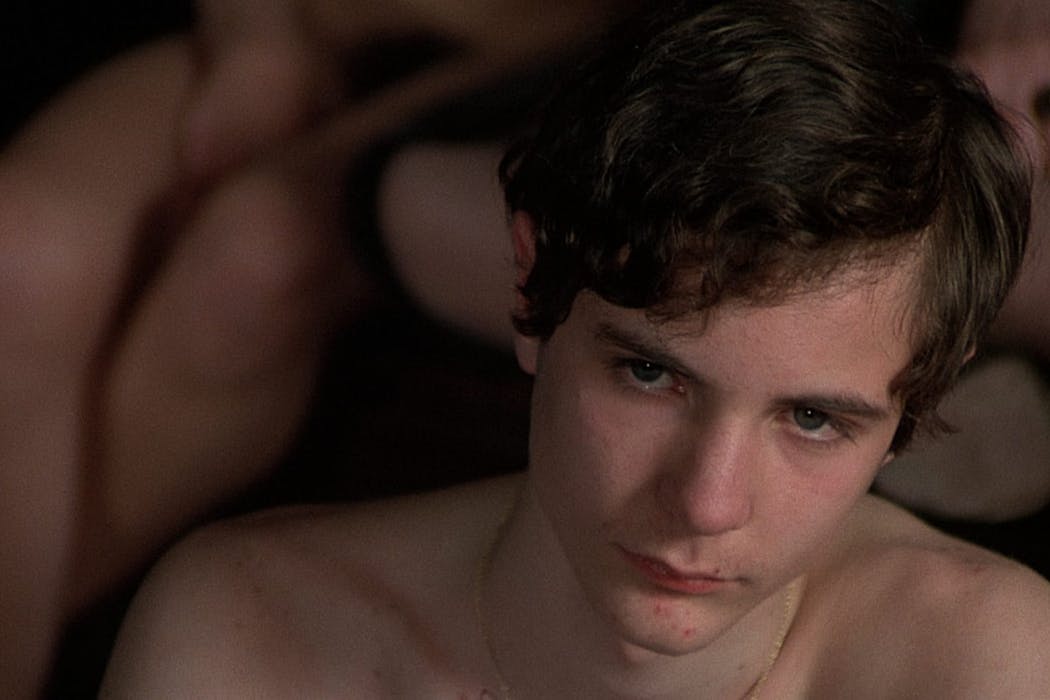
Pier Paolo Pasolini’s Salò, or the 120 Days of Sodom is turning 50. One of cinema’s most notorious films, Salò continues to be approached with trepidation – if approached at all.
Adapted from the equally infamous book by the Marquis de Sade, Salò is, ostensibly, Pasolini’s attempt to grapple with the violent legacies of Italy’s Fascist past. Yet it is much more than a history lesson.
In Salò, Pasolini tests the limits of what can be depicted. Terror and torture. Sexual assault and psychological savagery. Mutilation and murder.
According to film critic Richard Brody, Salò
is essential to have seen but impossible to watch: a viewer may find life itself defiled beyond redemption by the simple fact that such things can be shown or even imagined.
A polarising tale
Across four episodes inspired by Dante, Salò tracks a group of teenage abductees corralled into a rural villa by a clique of Fascist bureaucrats, where they are subjected to a catalogue of ordeals, each more dehumanising and terrible than the last.
Startled by the film’s extreme nature, many contemporary critics recoiled in response. Novelist Italo Calvino felt the film was irresponsible and unfocused. The New York Times dismissed Salò as “thin and superficial”, symptomatic of Pasolini’s increasingly “bitter” directorial sensibility.
As polarising now as on release, Salò – banned in Italy after a brief theatrical run – continues to exert a dark gravitational pull. Director Michael Haneke, who listed Salò in his top ten features of all time, describes how it
scared me so much that I was sick for 14 days. Completely wiped out. To this day, I haven’t drummed up the courage to watch it again. Never again did I look into such a deep abyss and rarely have I learned so much.
More recently, novelist Olivia Laing has woven Salò into the fabric of The Silver Book, portions of which unfold on the film’s set.
As Laing argues, Pasolini’s vision – the bleakest ever committed to celluloidperhaps – has retained its visceral charge because of its predictive quality:
He saw the future we’re now in long before anyone else. He saw that capitalism would corrode into fascism, or that fascism would infiltrate and take over capitalism, that what appeared benign and beneficial would corrupt and destroy old forms of life. He knew that compliance and complicity were lethal.
Pasolini understood these dynamics because he had lived through them.
Totalitarianism and life
Born in Bologna in 1922, mere months before Mussolini’s March on Rome, Pasolini grew up in a regime defined by acquiescence, chauvinism and vulgar displays of power.
His Italy was one where totalitarianism seeped into every crevice of everyday life.
Before turning to film, Pasolini had already become one of Italy’s most prolific and controversial cultural figures, turning out poems, novels and essays at a truly prodigious rate.
Openly gay and staunchly Marxist, he was admired abroad but treated with suspicion by Italy’s conservative establishment.
Salò was a furious rejoinder to his own Trilogy of Life – a series of raucous cinematic reworkings of The Decameron (1971), The Canterbury Tales (1972) and Arabian Nights (1974). The trilogy championed eroticism and communal pleasure, but Pasolini had grown disillusioned with how they had been received.
What had been intended as a celebration of bodily autonomy and pre-modern vitalism had, in Pasolini’s eyes, been assimilated by the very forces he despised.
Lamenting the absorption and commercialism of sexuality by consumer capitalism – which turned liberation into another commodity to be bought, sold and stripped of all subversive charge – he resolved to make a film that could not be recuperated by the marketplace.
He wanted to make a film that – in queer media historian Susan Potter’s reckoning – “could not be digested as entertainment”.
Salò was the result. Made during the Italian Years of Lead, an era marked by extremist political violence, the film looks back to the Nazi-backed Republic of Salò on Lake Garda.
Pasolini explained he set the film in 1945
because the end of the war marks the beginning of our own time, when eroticism is perverted into commerce.
Salò, he insisted, was “his first film about the modern world”.
A brutal end
Pasolini never saw Salò released. On November 2 1975, just weeks before the scheduled premiere, he was brutally murdered on the outskirts of Rome. The official narrative was that he had been killed in a nocturnal scuffle with a teenage sex worker. Almost immediately, however, cracks began to emerge.
The ferocity of the attack, the inconsistencies in the testimony of the young man accused of the crime and Pasolini’s blistering critiques of Italy’s political and cultural elites fuelled decades of suspicion that have never fully abated, with suggestions that the killing was a political assassination.
Salò played an unsettling role in all of this. During production, several film reels were stolen by a criminal gang demanding ransom. Pasolini refused, replacing the missing footage with alternate takes. Some have speculated a desire to recover this missing material may have led Pasolini to his ghastly fate.
Whether that is true remains uncertain. What is indisputable, half a century later, is that Salò has lost none of its appalling power.
Pasolini was not simply chronicling the past. He was warning us about the nightmarish realities of our late capitalist world, where violence is rife, the powerful act with impunity and the human body is just another resource to be exploited.
We ignore that warning at our peril.
This article is republished from The Conversation, a nonprofit, independent news organization bringing you facts and trustworthy analysis to help you make sense of our complex world. It was written by: Alexander Howard, University of Sydney
Read more:
- The Holodomor on screen: how cinema shapes memory of Ukraine’s famine
- Testimony: new documentary shows a stark reckoning with Ireland’s Magdalene past – and the long fight for justice
- Films like A Kind of Madness and Rose of Nevada are helping us see dementia differently
Alexander Howard does not work for, consult, own shares in or receive funding from any company or organisation that would benefit from this article, and has disclosed no relevant affiliations beyond their academic appointment.


 The Conversation
The Conversation
 Arizona Daily Sun
Arizona Daily Sun What's on Netflix
What's on Netflix Cleveland Jewish News
Cleveland Jewish News Columbia Daily Tribune
Columbia Daily Tribune CBS News
CBS News Ocala Star-Banner
Ocala Star-Banner IMDb TV
IMDb TV ABC30 Fresno Entertainment
ABC30 Fresno Entertainment The Hollywood Reporter Movies
The Hollywood Reporter Movies 101.5 KNUE
101.5 KNUE